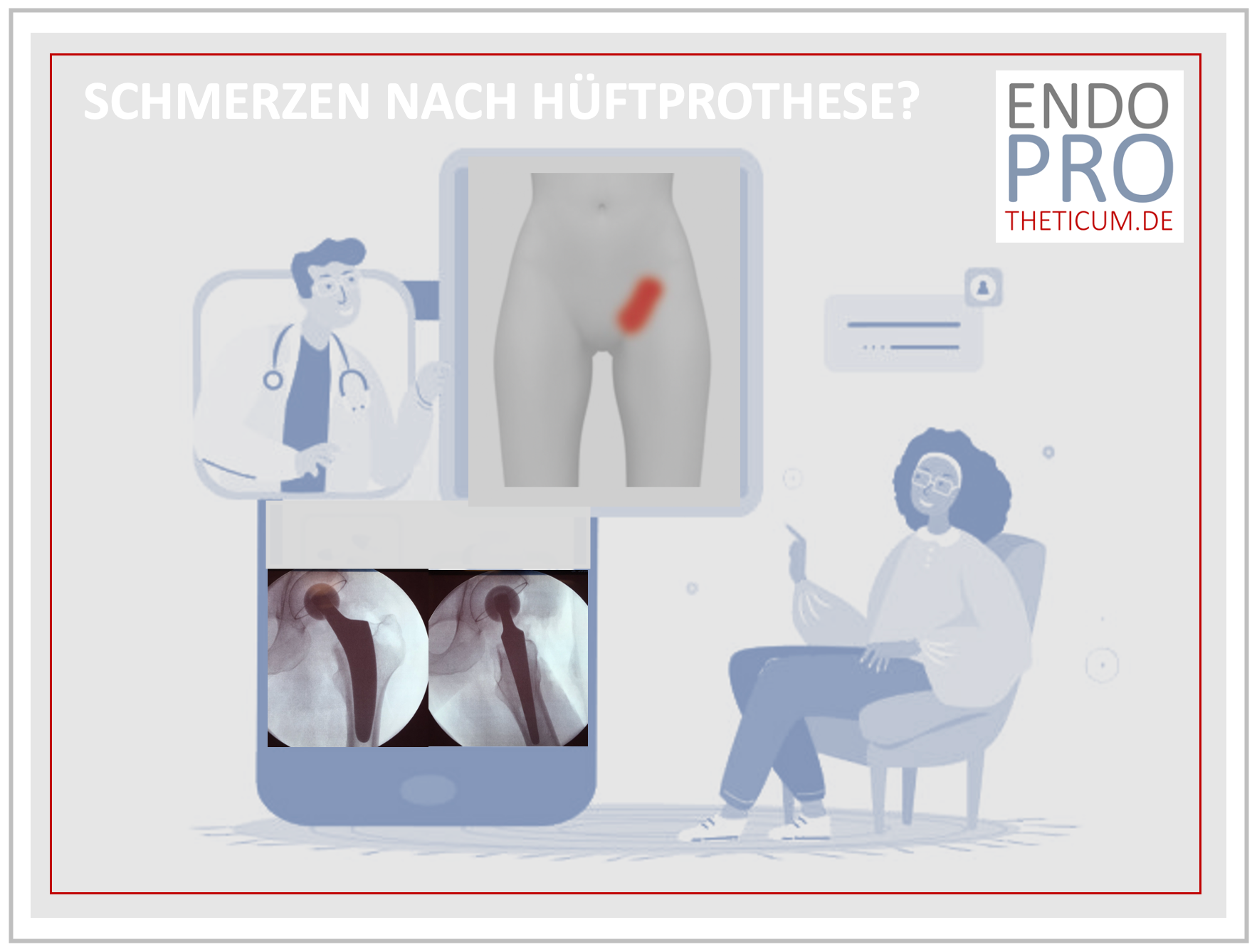Pain after hip replacement – what to do?
What to do if the hip replacement hurts?

Hip prosthesis (THA) implantation is one of the most successful orthopedic surgeries, often providing patients with significant pain relief and improved mobility. However, postoperative pain can still occur after hip replacement, which poses challenges for both patients and doctors. This comprehensive article highlights the possible causes of pain after a hip replacement and presents effective therapeutic measures. The aim is to help those affected to better deal with their situation and to initiate the right treatment steps.
Why does pain occur after hip surgery?
Postoperative pain can occur for a variety of reasons, ranging from normal healing processes to serious complications. They can be divided into acute and chronic pain.
1. Acute pain
- Surgical trauma: Cutting tissue and muscle inevitably causes pain, which subsides as healing occurs.
- Inflammatory response: The body's natural response to surgery.
- Swelling: Tissue edema surrounding the surgical area.
2. Chronic pain
- Improper positioning of the prosthesis: Improperly placed implants can cause incorrect loading.
- Scar tissue: Adhesions or thickenings can irritate nerves.
- Loosening of the prosthesis: Mechanical instability leads to recurring pain.
- Infections: An infected denture is a serious complication.
Typical causes of postoperative pain after hip replacement
1. Wound healing pain
This pain is common and is a natural reaction to the procedure.
Therapy:
- Protection of the affected leg.
- Applying ice packs to reduce swelling.
- Painkillers such as ibuprofen or paracetamol.
2. Muscle weakness and muscle imbalance
The muscles are severed during the operation and need time to regenerate.
Therapy:
- Physiotherapy to strengthen muscles.
- Regular, joint-friendly exercise such as swimming.
3. Incorrect loading of the joint
An incorrect walking style or leg length discrepancies can disrupt balance and cause pain.
Therapy:
- Gait training with a physiotherapist.
- Orthopedic insoles or adjustments by an orthopedist.
4. Infections
Infections around the implant can cause acute pain and limited mobility.
Therapy:
- Antibiotic treatment.
- In severe cases, surgical removal of the prosthesis.
5. Nerve irritation or injury
Damage to nerve structures can cause severe pain or numbness.
Therapy:
- Injections of corticosteroids to reduce pain.
- Special pain therapy for neuropathies.
Diagnosis of pain after hip surgery
A correct diagnosis is crucial to identify the cause of the pain and treat it specifically.
1. Clinical examination
The doctor checks the mobility of the joint, locates painful areas and analyzes the gait.
2. Imaging techniques
- X-ray: assessment of the prosthesis position.
- MRI or CT: Analysis of soft tissue damage and loosening.
- Scintigraphy: Localization of infection or inflammation.
3. Blood tests
Elevated inflammatory parameters such as CRP or leukocyte count indicate an infection.
Acute pain after surgery – immediate help
1. Pain management
- Use of analgesics tailored to the intensity of the pain.
- Local cooling.
2. Exercise and rehabilitation
- Early mobilization under physiotherapeutic guidance to avoid stiffness.
3. Pain-relieving aids
- Helped to relieve the burden.
- Compression stockings to reduce edema.
Chronic pain after hip replacement and its treatment options
1. Revision surgeries
In the event of serious complications such as a loosening of the prosthesis, further intervention may be necessary.
Indication:
- Persistent pain despite conservative therapy.
- Mechanical instability or inflammation.
2. Special pain therapy
Chronic pain often requires multidisciplinary treatment.
Possibilities:
- Pain modulation medications (e.g. gabapentin).
- Local anesthetics or nerve blocks.
3. Physical therapy and occupational therapy
Non-invasive methods to improve mobility and quality of life:
- Water therapy.
- Electrotherapy for muscle stimulation.
Prevention of pain after hip surgery
1. Optimization of surgical preparation
- Physiotherapy to strengthen the muscles before the procedure.
- Dietary changes to promote healing.
2. Postoperative measures
- Regular information about realistic healing processes.
- Early exercise under professional guidance.
3. Regular follow-up care
Routine checks by the treating orthopedist help to identify problems at an early stage.
Summary and conclusion
Postoperative pain after a hip replacement (THA) is treatable in most cases and is often part of the healing process. A systematic diagnosis and coordinated treatment options are crucial for long-term success. Patients should communicate their complaints openly and work closely with doctors and therapists. With the right measures, a pain-free life and unrestricted freedom of movement can be achieved. Only rarely does further surgical intervention actually need to be carried out.
MAKE AN APPOINTMENT?
You are welcome to make an appointment either by phone or online .




























